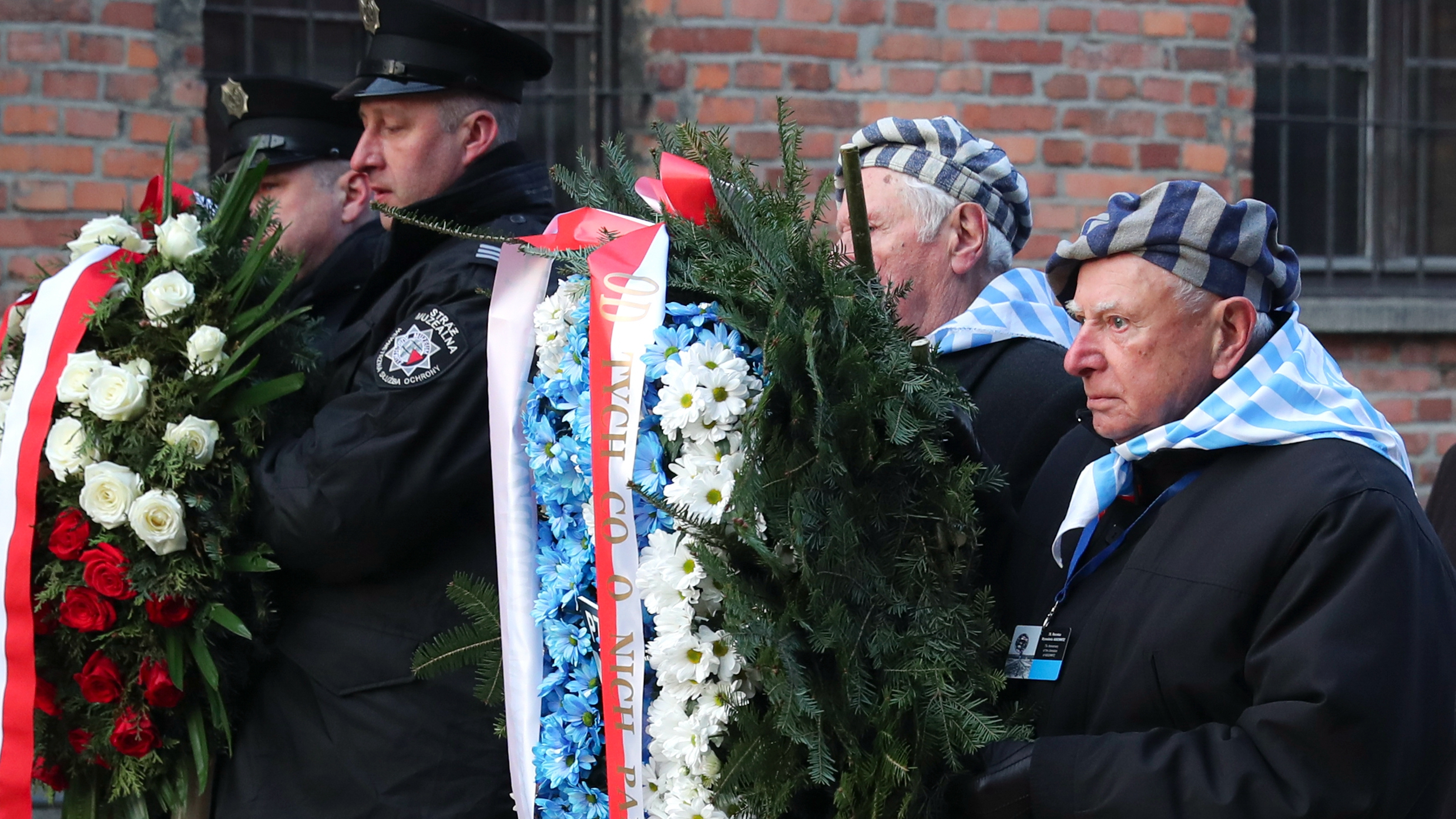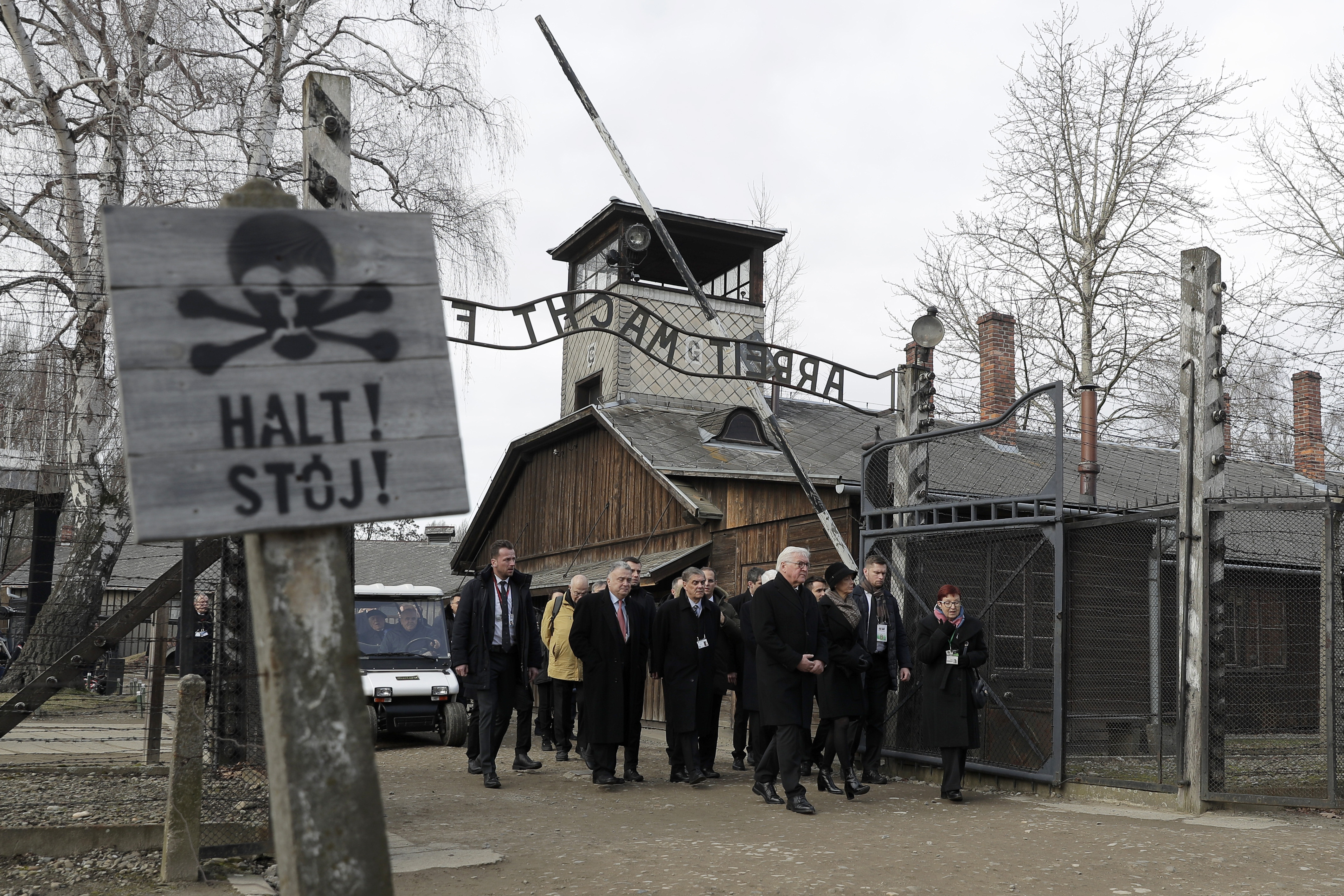
Survivors carry a wreath at the former Nazi death camp of Auschwitz in Oswiecim, Poland, January 27, 2020. /AP Photo
Survivors carry a wreath at the former Nazi death camp of Auschwitz in Oswiecim, Poland, January 27, 2020. /AP Photo
Survivors and world leaders gathered on Monday at the former Nazi death camp of Auschwitz-Birkenau to commemorate its liberation by the Soviet Red Army 75 years ago, highlighting their "obligation" to pass on this history to future generations as a buffer against hate.
Some 200 former prisoners and Holocaust survivors traveled to the event from around Europe and as far as the U.S., Australia and Canada.
They were joined by Polish President Andrzej Duda, German President Frank-Walter Steinmeier, Israeli President Reuven Rivlin and over 50 representatives from other countries, the European Union and the United Nations.
"It's been 75 years since the end of that monstrous, horrendous and criminal nightmare that was unfolding in this place for nearly five years. It has been three generations," Duda said in the opening address. Paying tribute to the survivors present, "the last of those who saw the Holocaust with their own lives," he said the world had an "obligation" to victims and to future generations to tell their stories.
Earlier, some of the survivors laid wreaths near the spot in the former camp where many prisoners were executed.
Read more: Auschwitz at 75: A dark reminder of the dangers of anti-Semitism
Auschwitz was the deadliest of the Nazis' concentration and death camps. In all, 1.3 million people were deported there from all over Europe between 1940 and 1945. Of those, 1.1 million were killed, including 1 million Jews, many of them sent straight to the gas chambers upon arrival. There were also Poles, Soviet prisoners of war, Roma or gypsies, and deportees from Hungary, France, the Netherlands or Greece.
The camp's liberation on January 27, 1945 is now commemorated every year as International Holocaust Remembrance Day.
Ahead of the anniversary, survivors spoke up again, urging the world not to forget the horrors of the Holocaust and warning against the dangers of extremism and racism.
"I have returned so that I don't forget any of the details of what happened to me, so I can keep the memories alive, and stop the world from acquiring amnesia," former prisoner Benjamin Lesser, 92, told The Guardian.
"We want the next generation to know what we went through and that it should never happen again," another Auschwitz survivor, David Marks, 93, told journalists.

German President Frank-Walter Steinmeier visits the Nazi death camp of Auschwitz in Oswiecim, Poland, January 27, 2020. /AP Photo
German President Frank-Walter Steinmeier visits the Nazi death camp of Auschwitz in Oswiecim, Poland, January 27, 2020. /AP Photo
This year's ceremony has taken on special significance as it will likely be the last major anniversary for many survivors, who are now in their 80s and 90s.
The 75th anniversary also comes amid fears over rising anti-Semitism, with recent attacks on synagogues in Germany and the U.S.
Such attacks "serve as heartbreaking reminders that history has the potential to repeat itself," Ronald S. Lauder, president of the World Jewish Congress and one of the speakers at the Auschwitz ceremony wrote on Saturday, calling for continued efforts to inform and educate future generations.
"All of it must be forever known, passed down and taught, if we are to have any hope that humanity's capacity for hate does not overcome us again," he wrote.
In a recent Pew Research Center survey, less than half of Americans knew that 6 million Jews were killed during the Holocaust and one third of respondents were unable to place the Holocaust in the right decade.
In a separate survey in France, 25 percent of respondents under 38 said they had never heard of the Shoah – another term for the Holocaust – while 23 percent said it was a myth or that the number of people killed was "widely exaggerated."
On Sunday, Dutch Prime Minister Mark Rutte apologized for his country's failure to protect Jews during the Holocaust – the first time the Dutch government has issued such an apology.
"We did too little. Not enough protection, not enough help, not enough recognition," he said. "I apologize on behalf of the government for the actions of the government at the time."
Pope Francis also called on Catholics worldwide to "stop for a moment of prayer" and vow "never again, never again."